
Hari Hari,
This week was continued exhaustion and headaches, like last week. Satsvarupa Maharaja was able to fit some poems in the “windows” that he got. The writing is what keeps him going week after week—a Parkinson’s triumph, despite all odds.
Baladeva
ANNOUNCEMENT
GN Press Needs / Services Available
We need to expand our team of proofreaders as we aim to increase the rate of republication of Satsvarūpa Mahārāja’s books as well as new books that he writes.
This includes a need for fluent bilingual Spanish and English speakers to proofread Spanish translations (we currently have around 20 Spanish translations waiting to be proofread).
Anyone interested in this particular service should contact Manohara dāsa at [email protected]
If you would like to help, please contact Kṛṣṇa-bhajana dāsa at [email protected] or [email protected] and we will find you a service that utilizes your talents.
I wrote a note to Madhu asking him for suggestions how I can best use the remainder of my japa retreat. The thing that struck me the most about his reply was his comment, “You want to be fervent—the best goal is not achieved by mediocre practice—practice can lead to contempt/familiarity and destroy fervor.”
******
For all its faults, my book Entering the Life of Prayer is fervent. I am not so fervent now. I am almost urbane about my inability to pay attention to the holy name. The dictionary defines fervent as “ardent: passionate.” How do you become like that? You can’t just turn it on.
Nothing should be imitated. That’s why I so much value the quality of honesty. What if I am honestly not fervent?
******
Pure fervent prayer is desirable. Raghunatha dasa Gosvami prayed:
“O my uncomprehending inner self, my dear brother mind, I humbly prostrate myself before you. Taking hold of your feet, I beseech you, please give up all pride and surrender fully to Sri Guru, to the spiritual abode of Vraja-dhama, to the residents of Vraja, to all the Vaisnava devotees of the Lord, to the sattvika-brahmanas, to the holy name of the Supreme Lord, and to the ever-fresh and youthful Divine Couple of blossoming beauty, Sri Sri Radha and Krsna, and in this way quickly develop sublime attachment to Them” (Manah-siksa, Verse 1).
******
Fervor—feeling regret, feeling helpless that you are a fallen, conditioned soul. Fervor—intense greed, praying to Radha-Krsna, praying that Their pastimes will descend into your japa, crying to Them.
Without pure fervor and desire, then even the increase to forty rounds, fifty rounds, sixty, seventy, will be not so wonderful. I should want more than just control of the mind. What essence will I carry past these three weeks of increased chanting? Where is that fervor? Where is Krsna’s grace?
******
“Srila Vyasadeva saw the all-perfect Personality of Godhead. This statement suggests that the complete unit of the Personality of Godhead includes His parts and parcels also. He saw, therefore, His different energies, namely the internal energy, the marginal energy and the external energy. He also saw His different plenary portions and parts of the plenary portions, namely His different incarnations also, and he specifically observed the unwanted miseries of the conditioned souls, who are bewildered by the external energy. And at last he saw the remedial measure for the conditioned souls, namely, the process of devotional service. It is a great transcendental science and begins with the process of hearing and chanting the name, fame, glory, etc. of the Supreme Personality of Godhead. Revival of the dormant affection of love of Godhead does not depend on the mechanical system of hearing and chanting, but it solely and wholly depends on the causeless mercy of the Lord. When the Lord is fully satisfied with the sincere efforts of the devotee, He may endow him with His loving transcendental service.” (Bhag. 1.7.6, purport)
******
Srila Prabhupada says Krsna consciousness is not difficult. “You don’t have to do anything. Just man-mana bhava mad-bhakto, always think of Krsna.” But that requires love. The fervor you speak of is also love.
******
Rupa Gosvami’s verse further states that when we chant Hare Krsna thinking of Krsna’s rasika form and pastimes in Vrndavana, we should do it under the guidance of a vrajavasi rasika Vaisnava. Without such guidance from the rasika spiritual master, we are like animals. If one follows all these instructions, then he has grasped the upadesa-saram, the essence of all teachings.
******
Reading rasika books between rounds will stimulate and help remembrance. By reading and chanting such slokas, our hearts will melt. And if our heart sometimes melts and is sometimes dry? “Then drink water from the mouths of Vaisnavas.”
pp. 15-22
It may be somewhat surprising for a new reader to consider how to please Prabhupāda, since it may not as yet have occurred to him that he should please Prabhupāda. But those who are familiar with Vedic philosophy know that pleasing the guru is the conclusion of the philosophy. Therefore, we want to discuss how one can please Śrīla Prabhupāda. One should not approach Prabhupāda only from a scholarly distance, but he should try to relate to Prabhupāda as a spiritual master.
The siddhānta of pleasing the spiritual master in disciplic succession is stressed in the Vedas and especially in the Vaiṣṇava sampradāyas more than in any other religious tradition. Lord Kṛṣṇa told Arjuna, “Those who are directly My devotees are actually not My devotees. But those who are devotees of My servants are factually My devotees.” (Cc. Madhya, 11.28) Lord Kṛṣṇa Himself exemplified the principle of pleasing the spiritual master in His own relationship with Sāndīpani Muni. Both Kṛṣṇa and Sudāmā had worked hard to please their guru by willingly sacrificing their own personal comfort in order to carry out the instructions of Sāndīpani Muni. Kṛṣṇa said to Sudāmā, “Both of us can realize that without the blessings of the spiritual master, no one can be happy. By the mercy of the spiritual master and by his blessings, one can achieve peace and prosperity and be able to fulfill the mission of human life.” (KRSNA, Ch. 80) Sāndīpani Muni blessed them that all their desires and ambitions would be fulfilled.
Another example of receiving the power of Kṛṣṇa through the spiritual master is the case of Bali Mahārāja. Bali Mahārāja satisfied his spiritual master and therefore became strong enough to drive the demigods from the heavenly planets. Śrīla Prabhupāda comments that by the pleasure of the spiritual master, “one can get extraordinary power, especially in spiritual advancement.”[1] The blessings of the spiritual master are more potent than our own endeavors to advance spiritually. The paramparā system endows an individual with the original power coming down from the Supreme Personality of Godhead.
Similarly, Sūta Gosvāmī was described by Śaunaka Ṛṣi at Naimiṣāraṇya as being very submissive and as therefore receiving the favors of his spiritual master. But Indra displeased his spiritual master, Bṛhaspati, and lost everything.
Śrīla Prabhupāda sometimes used the analogy of wanting to please a very influential man. It is difficult to directly approach and satisfy such a person, but if one pleases his little son, or even his dog, then one can be successful. “Friends meet friends, and if the friend comes with his dog, the gentleman pats his dog first, is it not? So, the man becomes automatically pleased, his dog being patted… Without pleasing the spiritual master, he cannot please Kṛṣṇa. If anyone tries to please Kṛṣṇa directly, he’s fool number one.”
Even if the spiritual master is not a mahābhāgavata, the follower should be satisfied. One who is linked to the paramparā in submission to the previous ācāryas and who strictly follows his own pure devotee spiritual master should be considered bona fide. By our own service to such a spiritual master and by following the principle of always trying to please the spiritual master, our own spiritual advancement is guaranteed.[2] Certainly, if we get the opportunity to serve a mahābhāgavata devotee we should do so by all means. For example, Dhruva Mahārāja fully engaged himself in following the instructions of Nārada Muni, and he became so powerful that Lord Viṣṇu agreed to be “conquered” by him.
We can please Śrīla Prabhupāda by carrying out his instructions with sincerity. We have to actually love to serve his order and give ourselves to him in service. He is a pleasing master to serve, and yet our minds may offer many reasons to resist serving him. Ultimately, if we desire to resist Kṛṣṇa consciousness, to avoid the stage of anartha-nivṛtti (giving up unwanted habits), and to remain comfortably in material consciousness, we will have to avoid Śrīla Prabhupāda’s association. But by the power of serving Śrīla Prabhupāda (who carries the power of Kṛṣṇa in paramparā), a sincere seeker can have his or her material attachments ripped out by the roots and become a pure devotee of Kṛṣṇa.
How do we please Śrīla Prabhupāda? To begin with, we must accept him as the authority. A devotee who was working as a construction worker once said that Prabhupāda was the best “boss” he ever had. There are many different moods in which we may accept Śrīla Prabhupāda—but we have to recognize that he is the leader.
We also have to accept him as a transcendental person. In my own case, in the beginning, I was serving Śrīla Prabhupāda mechanically and yet I expected him to love me. But he told me, “If you love me, then I will love you.” It is up to each of us to approach Śrīla Prabhupāda and to love him. We also have to learn to accept his reciprocation in whatever form it appears, as an expression of his love for us. As soon as we become appreciative of the gifts that Prabhupāda is offering us, then the question of how to please him is easily answered. If you love a person, you will find a way to please him; the desire to please him will fill your thoughts.
pp. 71-77
All I do is write about
a gray dawn walk,
joy walk, feet,
Krsna coming out
of my mouth, an
inherent
stream. Every jiva is
entitled to chant,
unfortunate as we are.
Gray pebbles soldered
together
by workmen. No cars at
this hour. I can’t see a hare
running yet—too dark.
Puddles are silver and my
eyes can make out the
road. Chanting.
I think of clever cues to give
students about writing:
“Imagine you love Krsna.”
“Think of a time you saw
Him and realized that
everything is in Krsna.”
Wonderful writing cues. I
wait
for the day when I can give
out notebooks and Bic pens
and say, “Go. Ten minutes.”
Everyone’s head down,
they’re writing their
realizations. Painful for
some.
“I can’t do it! I have no
realization!” “Then write
that.”
At the bridge, water
stronger from rain. A new
whitewater side-
stream pushes over the
rocks and joins the
waterfall. Lights from
an approaching truck—but this
is an off-road. He won’t come
across this bridge.
Krsna says tat srnu.
Write something positive:
“I like hearing
from Krsna directly because …”
I walked past the sign, “72 acres
and old farm house.” It now
has a diagonal banner across
it, “Sale Agreed.” Too bad. I
could have bought it and
written a tome while living
there. I would write
based on verses from Bhagavad-gita
6.29 or 6.30, about the devotee and
at the same time about Krsna.
They go together and can’t be
separated. Not that Krsna
is alone without His devotee
or that we exist without Him.
I have to ask myself why I have come here:
to praise the Lord of mercy.
A few young bhaktas
in the city of
Baltimore live
together,
worship, and know that the holy names
are forever.
“Keep cool,” she said, and gave me a check
to use in Krsna’s service.
Dija hear that six vans raced all
over America, brahmacaris in
summer distributing
36,000 pieces of literature—
Prabhupada’s books? Rejoice! The
spirit is back,
the land rejuvenated
while we weren’t watching.
Between 1969 and 1978 a generation
appeared who are not against the Hare
Krsna movement. Their parents had
bought Prabhupada’s books.
I finished answering the mail.
Finished Sunday, or Sunday
finished me. Now it is Monday
and I don’t have to work
for a karmi. I am fortunate.
What am I saying?
I am saying I want to go for a walk
and chant better, and when I am at
the half-way mark after half an
hour,
under the less-than-
half-moon in the
bluing sky,
then I want to speak by
God’s grace. I start a
letter beginning,
“Dear—” and pour out
sincere feelings—
I love you, I love the earth,
I fall short, please lift me up,
please let me serve the
devotees. You are so
kind.
A narrow tarmac road in Eire
and the walk goes by quickly
as I reach through the
paragraphs of the letter and
reach a likely conclusion,
a little disappointed
because nothing is new.
When I reach the cattle gate near
our house I cut it short,
“Thanks for this. It really has
been nice.” Then on up the
hill,
trudging out one last round
before I enter
where my companions greet me
as I take off my boots.
To the mouse whose body I
found
but could not find the next day,
a small prayer, “Please save
me too.”
To the sharp rocks, to the
slim waterfall, to words
and especially to
my own mind,
I bid you good day
on this cool May made radiant
by God’s grace.
The lamb standing by the
door of the outbuilding has
an infected foot, skin boiled
up pink, a painful knob
there. She shifts
nervously, slightly, when
I approach. Looks like a
modest girl who wants to
come out of the shadows
and beg something.
I’ve decided I have to preach
and think
about preaching even while
alone for a while. But I also
have to chant alone,
see into the problems
of my inattention.
It’s a yogic siddhi to be able to
fix the mind the way Prahlada
prayed to Nrsimha.
Just chant and read—I
do a pitifully small amount of
reading—and write to find
that nonpretentious voice.
Overturn, rebel, see Krsna as
Master
and most important person
in your life—more important
than me or the
lamb by the doorway,
the dawn, stars, jet trails
in the sky. Everything is
Him.
Sarvam kalv idam brahma
The work is to find
Krsna dearmost in my
body and the world and
perceive with senses, even
dreams and tongue and
to serve
Him, please Him. I don’t
understand or feel yet how
it all goes on,
but sastra says that it’s
not for His benefit but ours
that
we surrender. It’s not
“too much to demand.”
Krsna is the Lord.
Just something simple
to counteract the madness
of scribbled art—
my own and that of New
Poets of the ’90s, those
tough, hard-edged stories
of Chicago, Chinatown,
killings and L.A., going to
the movies and coming
out and seeing the World.
Just something simple such as
offering cereal to my spiritual
master or my new plan to
read aloud before him from his book
in the afternoon. Just now I
fingered the Isopanisad and Nectar
of Instruction and thought,
“I’ll read these again, these
small books written by my spiritual
master.”
pp. 67-77
“In my books the philosophy of Krsna consciousness is explained fully, so if there is anything which you do not understand, then you simply have to read again and again. By reading daily the knowledge will be revealed to you, and by this process your spiritual life will develop. . . You may please me the most by reading my books and following the instructions therein” (Letter to Baharupa, November 22, 1974).
A devotee in Mayapur once got up to leave in the middle of one of Prabhupada’s lectures. “Where is he going?” Prabhupada asked. “He has some work to do,” a devotee answered. This drew fire from Prabhupada: “What work? Nonsense! Unless you hear, what work can you do? It will just be karma unless you hear.” We cannot just read the books and do nothing for the spiritual master, but neither can we serve without the knowledge gained by reading the books. As Prabhupada states in the letter quoted above, we must both read the books and follow the instructions. This is the combination that pleases the spiritual master the most.
Although Prabhupada books purports provide answers to every question, sometimes devotees cannot understand the spiritual technologies described in them. In this letter, Prabhupada indicates that simply by reading his books again and again, one will, in time, come to understand. Reading Prabhupada’s books is not just an academic exercise or way to accumulate knowledge. Rather, it allows us to break through our material conditioning and receive the highest spiritual realization. As Prabhupada states, our spiritual lives develop by reading the books every day.
In the Siksastakam, Lord Caitanya compares the cleansing of the mind to the cleansing of a mirror, and in his letter, Prabhupada makes a similar comparison:
“Presently our consciousness is clouded just like a mirror becomes covered with dust. So the cleansing process is this chanting and hearing and doing some service and trying to please the spiritual master.”
On a mirror, dust accumulates daily, and to keep the mirror clean, that dust must be daily removed. The same is true of the mind and its contaminants. By hearing, chanting and serving, the mind becomes clear, but unless we practice these activities every day, we will again become covered.”
“Regarding my books, everyone should read. I am also reading… How much you should read and how much you should do other types of service, that has to be decided by each individual devotee” (Letter to Govardhan, February 15, 1975).
Prabhupada would often read his own books or have his disciples read to him. He would sometimes read in the quiet of his room, and when in Los Angeles, Prabhupada especially enjoyed sitting in his garden and listening to the devotees read from the KRSNA book. While traveling in airplanes, he would read from the Srimad-Bhagavatam, and when not reading, Prabhupada would tuck the volume into the pouch on the back of the passenger seat in front of him. Once, after returning home from a serious car accident in which he suffered injury, Prabhupada sat back and asked his servant to read to him from Caitanya-caritamrta. And in the very last days, whenever the devotes were not performing kirtana, Prabhupada would ask that they read to him.
Prabhupada would sometimes show amazement how Krsna spoke through his books. “These books are wonderful,” he would say to the delight of his disciples. “Actually, they are not written by me. They are written by Krsna.” Saying this Prabhupada did not intend to mean, “I am such a great person that I do not even know how great a person I am.” Nor did he think of himself as a great scholar or author. Rather, Prabhupada’s mood in expressing astonishment at the transcendental quality of his books is one of appreciation for the mercy his spiritual master and Krsna showed him in allowing him to be Krsna’s mouthpiece. As Prabhupada states in the concluding words in his translation of the Caitanya-caritamrta, “It is to be admitted that whatever translation work I have done is through the inspiration of my spiritual master, because personally I am most insignificant and incompetent to do this materially impossible work.”
In the letter quoted above, Prabhupada stresses that the devotee engage twenty-four hours a day in devotional service. “Eating and sleeping should be minimized, “he writes. “Not a single moment should be misused. “And in those rare situations where there does not seem to be any engagement, we should take the opportunity to read Srila Prabhupada’s books.
“… Go on reading the books and have the correct perception, and Krsna will help you. Siddhanta baliya cittena kara alasa/ iha ha-ite krsna lage ksudra manasa. A sincere student should not neglect discussions of such conclusions, considering them controversial, for such discussions strengthen the mind. You should always be alert and understanding the sastric conclusions that will help you, otherwise we can be misled by bogus philosophies. I am very pleased that you are studying the books. This will make you happy and successful.” (Letter to Ayodhyapati, September 22, 1976)
Sahajiyas reject the study of all Vaisnava literature in the claim that they are mundane and speculative. It is sentimental for a devotee to think that he should not argue philosophically. No devotee should renounce philosophical debate out of laziness or sentimentality. Rather every preacher must equip himself to defeat opposing philosophies by reading Prabhupada’s books. He should then enter the atheistic atmosphere created by material scientists and others and deliver the sastric conclusion, or siddhanta, on every issue of controversy. Such issues include the origin of life, the existence of God, whether God is personal or impersonal, God‘s identity, and the question of the divine origin of the scriptures. In the letter quoted above, Prabhupada writes, “In the Caitanya-caritamrta it is said that nobody should be neglectful of the siddhanta because by siddhantic conclusion one becomes firm in Krsna consciousness.” Throughout each of his books Prabhupada presents the Vaisnava conclusion. But we will ourselves become victims of bogus philosophies if we do not read Prabhupada’s books regularly. As Prabhupada writes in another letter, “In our Krsna Society, the boys and girls should now give more attention for studying the books very attentively. And to get the strength, one should chant the beads sixteen rounds without fail.”
pp. 17-20
Let me direct myself to you. I realize I don’t have to come here to do that. There are some visitors here this morning. In one group, there is an old man with some old women sitting together. Some of them have stopped to stare at me.
By coming near you, you will see me. Often, before November 1977, when a disciple you knew came before you, you would recognize him and direct a question to him. You might ask, “Is everything all right? What are you doing? Do you want something?”
The disciple could then take that as an opportunity to speak and ask direction from you. If you see me today, Srila Prabhupada, this is what I would say to you: “I am trying to physically come to your special places of worship and munis so you will see me and I can render some service. I want you to know what I am doing. Please tell me what you think is best for my advancement as your disciple.”
There are so many mandiras and tirthas in Vraja, but this is where I feel most comfortable. I belong here. People are coming by and throwing coins on your altar. There’s the noise of workmen and the loudspeakers from nearby asramas and shops. This is ISKCON, your home. I can circumambulate all of Vraja simply by circumambulating on these grounds.
(We will all have to follow you soon enough through the portal of death. I want my death to be the death of a Vaisnava servant. Perhaps I won’t accomplish such wonderful things during the remainder of my life, but if I can come closer to you, to your lotus feet, then all my purposes will have been achieved. I want sraddha. The white lions that stand guard around your samadhi guard me too, your worshiper.
“Gurudeva, give to this servant just one drop of mercy. I am lower than a blade of grass. Give me all help. Give me strength. Let me be as you are, without desires or aspirations.”
Prabhupada’s picture, how he looked in the last months, last weeks, here in Vrndavana. His face gaunt: “These are my last days.” His feet were swollen. Our glorious master. He inspired us by his example right up until the end. I don’t want to be unfaithful. I think I am in a good position now to be a simpler servant. (My head is cluttered and complicated, but I can be simple in my faith and allegiance to him.)
“I offer you all respects, for thus I may have the energy to know you correctly. Then by chanting the holy name in great ecstasy all my offenses will cease.” I want my rasa with you.
Chanting as you taught us,
offering prasada as you taught us.
Jaya om prayers and gayatri,
importance of preaching
and working in ISKCON,
the meaning of sannyasa
as worldwide preacher—
Srila Prabhupada you have given us
a wonderful home to live in
wherever we go.
You said, “Live with the devotees
and if you feel some inconvenience,
tolerate it. Don’t go away . . .
Don’t l-e-a-v-e
but l-i-v-e.”
Teach me, Gurudeva,
how to pray.
It’s hard to have the privacy here for prayer. Even my own secretary gets in the way. He says, “There’s a beadbag that you can put on Prabhupada.” And two matajis stand in front of Prabhupada’s door and bow down to me.
I can’t go back to those days and don’t want to exactly. I want to know you now, Srila Prabhupada. Do I dare? I’m afraid of you and what you might say, what you might order me to do. (I hear the click of a camera behind me. “Just see, Satsvarupa is sitting alone with Srila Prabhupada.”)
I cannot expect to live in a vacuum with him, and I cannot disown disciples I have accepted on Srila Prabhupada’s order. It was in this room that he said they will be our disciples.
Prabhupada wants us to live and give all our energy to his movement. Srila Prabhupada was progressive. Time has moved on from November 14, 1977 to September 15, 1993, and it will continue to go on. I can’t (don’t want to) create a dream that I’m alone in his room and he’s here and that Madhu doesn’t exist and that the ISKCON devotees are not gathered in the temple listening to Brajabihari’s morning announcements. But I do want to go deeper in my relationship with Prabhupada. Yesterday I prayed at Govardhana. I repeat that prayer privately to Prabhupada now.
The letter on Srila Prabhupada’s desk today is that long one to Yadunandana (Boston, April 13, 1968), answering his many philosophical questions. I wrote about that letter in my memoir.
I want to come closer to you, Srila Prabhupada, in all your aspects—as you taught in 1968, as you lived in India, as you were in this room in 1975, then in 1979, in 1993, as you are in your nitya-lila pravista. I can know you by service, beginning with hearing from you.
pp. 47-50
I don’t hanker after women; I don’t hanker after food. I don’t hanker after music anymore. My taste for books is even dwindling. But I like to write. My writing tastes, however, have changed, and I’m satisfied to write “speedwriting” and playwriting. By “playwriting” I don’t mean being a playwright. I mean writing playfully, writing playfully, writing playfully. So, all things considered, I am not a serious devotee who surrenders and gives everything for Kṛṣṇa. I don’t sacrifice for Him; I don’t construct beautiful things for Him. I don’t love Him greatly. BUT I WANT TO. I WANT TO LOVE KṚṢṆA AS MY ALL IN ALL—BUT I CANNOT DO IT. NOT YET.
This morning’s writing pleases me. I’d like to write what pleases Kṛṣṇa, and I’d like that to be what also pleases me. Am I being paradoxical and whimsical? Perhaps. I want to please Kṛṣṇa most, in my eating, and even in my lack of attraction for women. It’s true—I don’t like women, I don’t hanker after them—I just want to eat some pancakes with syrup on them, and as Baladeva promised me pancakes this morning, I will go for that. I am a whimsical person who loves Kṛṣṇa most of all and doesn’t like to play whimsy with food tastes and so forth. I beg to Kṛṣṇa to make me more austere, make me happier by eating less. I want to be Kṛṣṇa conscious without being extremely austere. I want to be able to die for Kṛṣṇa. I want to be austere for Kṛṣṇa. These achievements are not mine yet, but someday I may be willing to die for Kṛṣṇa and to give up everything for Him. Now I get obsessed with headaches, which are hard things for me to renounce. Even at this moment as I write, headaches are bothering me. I pray to Kṛṣṇa to relieve me from small pains and to allow me to give all pleasures for Kṛṣṇa and guru. I want the best things, the surrender to Kṛṣṇa.
******
I have written about many changes in my life. One can call them “turning points.” I think there is one turning point that is the greatest one for me and I will always remember it and treasure it. It happened very young in my life, when I was first becoming attached to and enamored with my spiritual master, Śrīla Prabhupāda. Falling in love with the spiritual master is probably the greatest change and event in one’s life. Unfortunately, one may lose this great change, this “turning point.” But if one holds on to it dearly and never lets it go, then one will have it for all one’s life. Also unfortunately, the opposite may take place. One may become greatly attached to his spiritual master but as he grows older, he may become duller and less attached to his guru. This is the most unfortunate thing that can happen. One loves one’s spiritual master and must do it for all time.
I reached a height in my affection for my spiritual master and I kept it. You mean to say you never lost your affection for your spiritual master? I admit that my love for my spiritual master suffered a waning, but I came back to my loving of him and my deep attraction to him. Therefore, it’s true that I love my spiritual master and will do so for the rest of my life.
I had a recent event which was very scary for me and brought me to fear of losing my deep love for Śrīla Prabhupāda. What happened wasn’t really my fault, but it was a great scare in my life where I thought I couldn’t love him as always….. I was 85 years old and still going strong. I was writing many books and loved my fellow devotees. But a terrible thing happened, and I thought I might be fired from the Fire Department, and I also thought I didn’t want to be in the Fire Department any more. I was plain scared.
Yet as bad as that fear of falling and injuring myself was, I had a much more wonderful period in my life, and I wish to write about that. This happened when I was very young, not even a sannyāsī or a grown-up devotee. I was barely a devotee. Here is the wonderful event that happened to me. I was very young in spiritual life. (I’m trying to remember it now to the best of my ability, but part of it is slipping away. This much I remember definitely.) Prabhupāda said to me, “If you love me, then I will love you.” I became elated, completely elated by his saying that. I ran down the stairs in the firehouse and grabbed my second-hand double bass, which I used to use in my jazz days. I played it on the way with great bliss. Prabhupāda loved me and he said, “If you love me then I will love you.” This is the best that I can remember it.
I repeat this. I experienced the greatest happiness when Prabhupāda told me that if I loved him then he would love me. And the scariest thing, which happened only a few weeks ago, was when I felt I was going to die as I scraped across the firehouse floor and became so frightened that I felt I would die.
pp. 236-40
Here we go there is no time
left. He has to take rest and
so, no meeting.
He got in late and couldn’t sleep
rehashing the concert he gave in
Govinda’s Restaurant
I’m Govinda’s slave we all are
in maya in this world
Yogamaya in that world
Krishna, Krishna hurry along who
will reach the scenic spot
first, who will touch
Krishna first
the gopis tease and He teases
back all amorous language
and why the pouting anger?
It’s another way to please and
love the Lord of all gods
people will never understand
but I do, a little. I know
I am covered still with material
modes – they make this
world seem real those
Time and Newsweek guys
But Krishna is with me
and will protect the devotees.
Don’t care for outsiders make
your own rhythm song.
pp. 53-55
***
Now we are entranced by the
sound of woodcocks the soft
cool breeze of a
morning gray in Eire I’ll
sing my songs to You
My Lord Krishna who took
me here and brought me to
this place to…
serenade with birds and
weeds and Krishna is in
everything.
pp. 77-78
***
You better believe it
down meadow’s mown the
man is lost he recites
out loud fingering on gloves
of his hand for gayatri
he’s nowhere as nice
as when he says
guru asraya
gurudevaya vidmahe
krnsanandaya
now, He’s that Lord in
your recital
your word pump
rock and stagger up a hill
wait for the triggered pain
the fresh fruit
the nice and hard
Krsna is trying to teach you
in His book, Govinda
when you learn and go
back to Him your
Lord won’t you love it
soon I say…
you better if you want to
be a ranger in this world
and seek out smart words,
smart bums, smart ass
cavalier,
you’ll die of it stretched
and strained
better you transfer your
energy to bhakti’s
principle
limbs.
pp. 78-79
***
Sad your lot you want
the easy way you can’t
have a pain-free comfrey
roses also shatter and
fall to earth. The wind
blows the petals and
time kills
if not the fox
or hunter.
But if you turn to God you’ll
find rest there eternal the
Vedas say and we believe.
We live according to the
code of guru
and Krishna in Goloka
myself is happy to take part
at least that way
for beginners, easy start you sing
eat prasada
and bow down – see the
forms of Supreme Lord, your
master is now or never telling you
what to do.
p. 107
***
The slow man bowed to the
temple Deity asked for favor,
not so hard on my knees Lord,
I don’t like to have my head banged
and as for all this suffering
minions of Thee…
the karmic ax. The solstice and
words strewn like flowers or
rain from a petty life –
duration he expects them to
last? As he grows older he
sees in a different way that
nothing of his life will last,
and that he achieved so little
remembers if he’s lucky
a time he was obedient
to radiant guru
in old days
and if he’s lucky,
self-reliant,
he turns to
him again
and he’s lucky.
p. 108
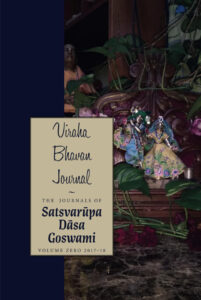
Viraha Bhavan Journal (2017–2018) was written by Satsvarūpa Mahārāja following a brief hiatus in writing activity, and was originally intended to be volume 1 in a series of published journals. However, following its completion and publication, Mahārāja again stopped writing books, subsequently focusing only on what became his current online journal, which began in August of 2018.

At first, I took it hard that I would have to live surrounded by the firemen, and without my own solitude. After all, for decades I had lived in my own house with my own books and my own friends. I was also now a crippled person who couldn’t walk, living among men who did active duties. But when Baladeva explained it to me, how it was not so bad living continually with other firemen and living in the firehouse with its limited facilities, I came to partially accept it and to accept the other men. I came to accept my new situation. I would live continually in the firehouse and mostly not go outside. I would not lead such a solitary life but associate with the other firemen.
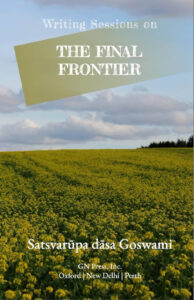
Let me write sweet prose.
Let me write not for my own benefit
but for the pleasure of Their Lordships.
Let me please Kṛṣṇa,
that’s my only wish.
May Kṛṣṇa be pleased with me,
that’s my only hope and desire.
May Kṛṣṇa give me His blessings:
Kṛṣṇa Kṛṣṇa Kṛṣṇa Kṛṣṇa Kṛṣṇa he
Rāma Rāghava Rāma Rāghava
Rāma Rāghava rakṣa mām.
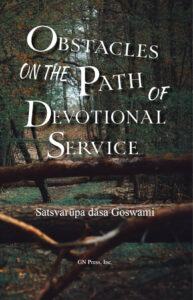
You mentioned that your pathway has become filled with stumbling blocks, but there are no stumbling blocks. I can kick out all those stumbling blocks immediately, provided you accept my guidance. With one stroke of my kick, I can kick out all stumbling blocks. —Letter by Śrīla Prabhupāda, December 9, 1972.
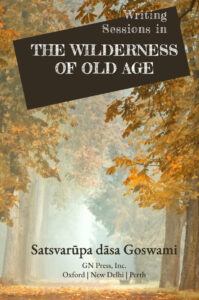
The Writing Sessions are my heart and soul. I’m trying my best to keep up with them. I am working with a few devotees, and they are far ahead of me. I wander in the wilderness of old age. I make my Writing Sessions as best I can. Every day I try to come up with a new subject. Today I am thinking of my parents. But I don’t think of them deeply. They are long gone from my life. Śrīla Prabhupāda wrote a poem when he was a sannyāsī, and he said now all my friends and relatives are gone. They are just a list of names now. I am like that too. I am a sannyāsī with a few friends. I love the books of Śrīla Prabhupāda. I try to keep up with them. I read as much as I can and then listen to his bhajanas.
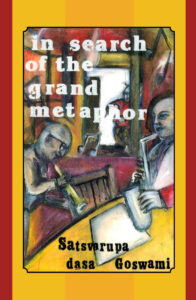
The metaphor is song. Explain it. Yes, particulars may not seem interesting or profound to readers who want structured books.
Wait a minute. Don’t pander to readers or concepts of Art. But Kṛṣṇa conscious criteria are important and must be followed. So, if your little splayed-out life-thoughts are all Kṛṣṇa conscious, then it’s no problem.
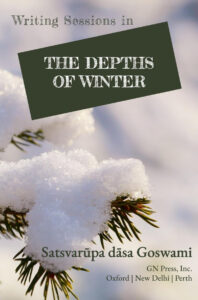
I am near the end of my days. But I do like the company of like-minded souls, especially those who are Kṛṣṇa conscious. Yes! I am prone to Kṛṣṇa consciousness. I have been a disciple of Bhaktivedanta Swami Prabhupāda for maybe almost sixty years. Sometimes I fail him. But I always bounce back and fall at his feet. It is a terrible thing that I sometimes do not have the highest love for him. It is a terrible thing. Actually, however, I never fall away from him. He always comes and catches me and brings me back to his loving arms.

This edition of Satsvarūpa dāsa Goswami’s 1996 timed book, Upstate: Room to Write, is published as part of a legacy project to restore Satsvarūpa Mahārāja’s writings to ‘in print’ status and make them globally available for current and future readers.
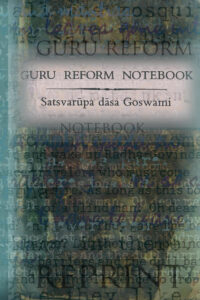
A factual record of the reform and change in ISKCON guru system of mid ’80s.

Readers will find, in the Appendix of this book, scans of a cover letter written by Satsvarūpa Mahārāja to the GN Press typist at the time, along with some of the original handwritten pages of June Bug. Together, these help to illustrate the process used by Mahārāja when writing his books during this period. These were timed books, in the sense that a distinct time period was allotted for the writing, during SDG’s travels as a visiting sannyāsī
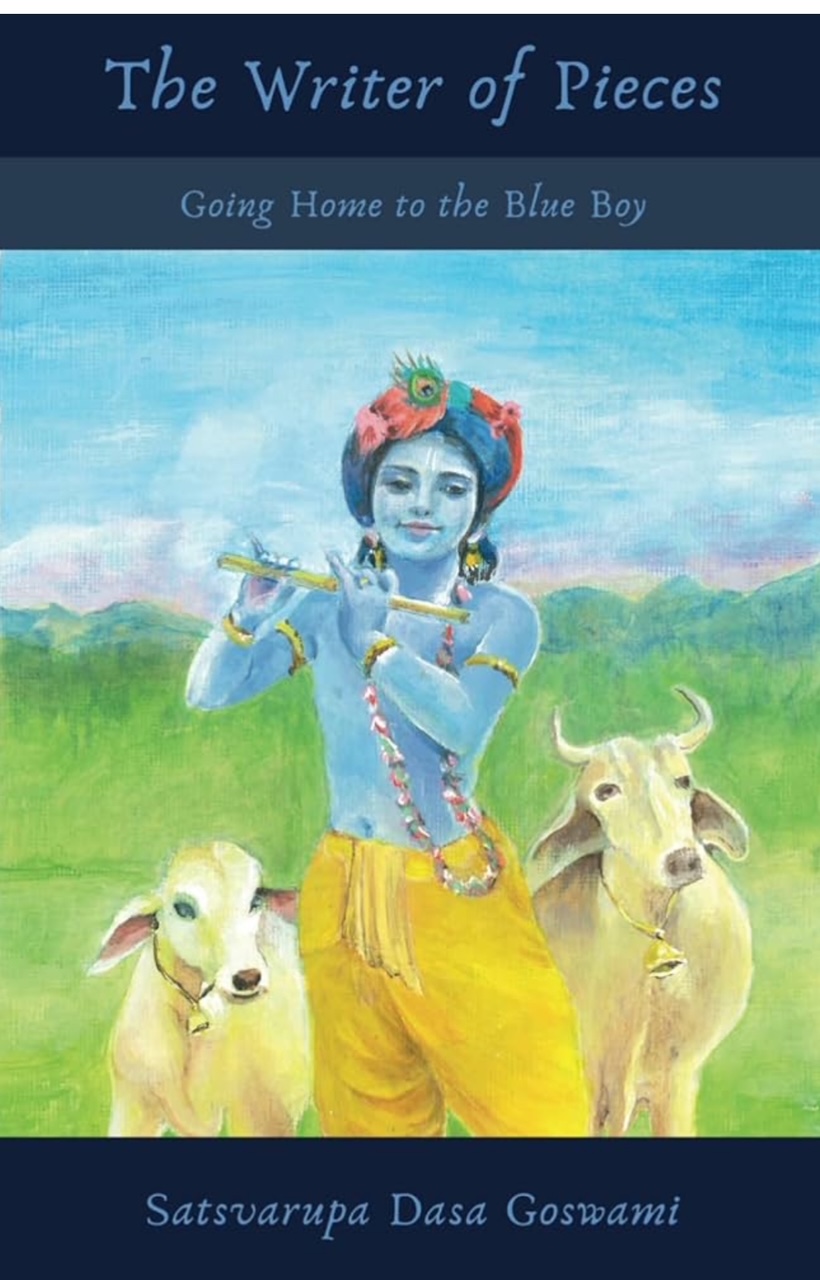
Don’t take my pieces away from me. I need them dearly. My pieces are my prayers to Kṛṣṇa. He wants me to have them, this is my way to love Him. Never take my pieces away.
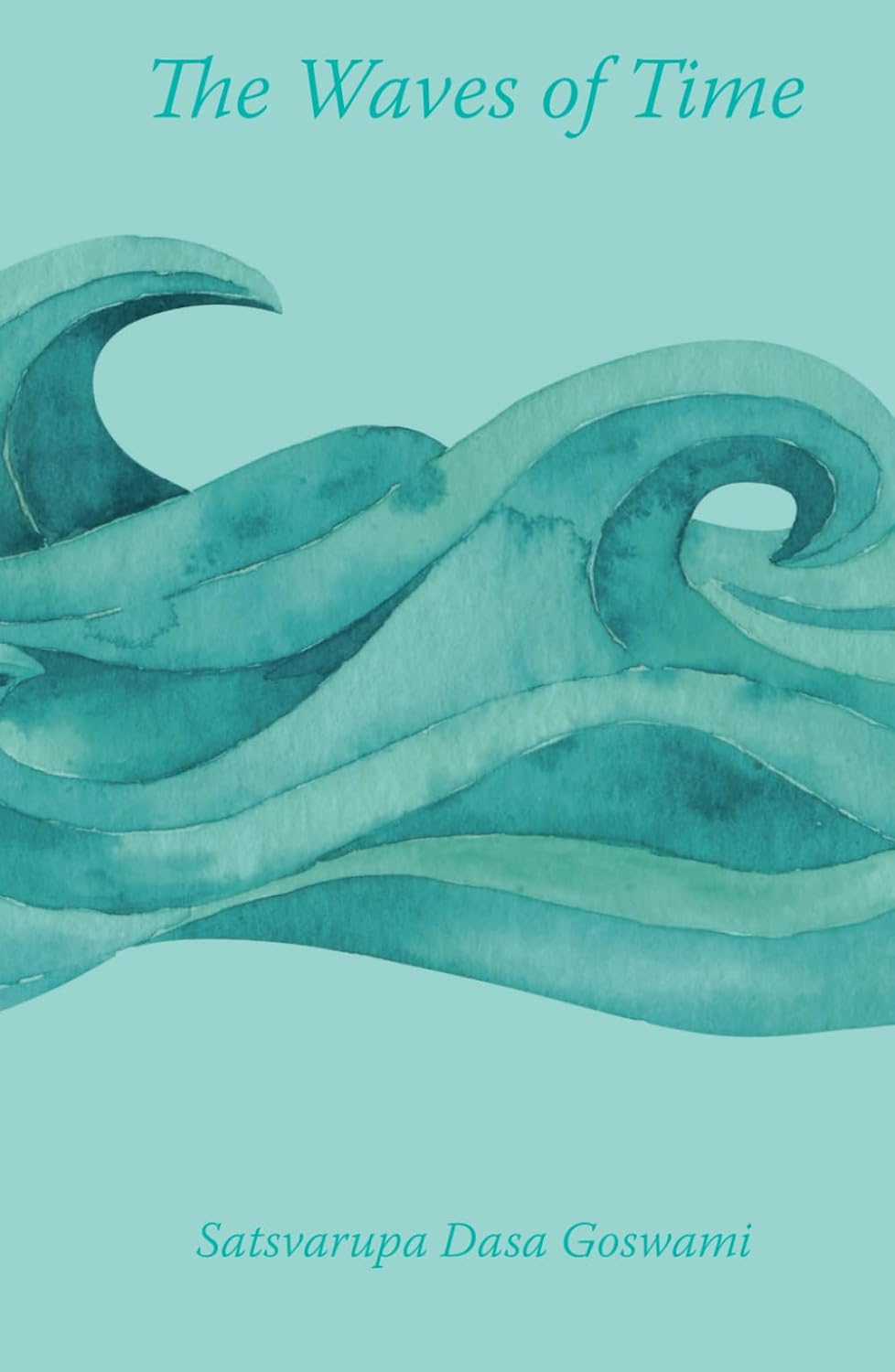
Many planks and sticks, unable to stay together, are carried away by the force of a river’s waves. Similarly, although we are intimately related with friends and family members, we are unable to stay together because of our varied past deeds and the waves of time.

To Śrīla Prabhupāda, who encouraged his devotees (including me) To write articles and books about Kṛṣṇa Consciousness.
I wrote him personally and asked if it was alright for his disciples to write books, Since he, our spiritual master, was already doing that. He wrote back and said that it was certainly alright For us to produce books.

I have a personal story to tell. It is a about a time (January–July 1974) I spent as a personal servant and secretary of my spiritual master, His Divine Grace A.C. Bhaktivedanta Swami Prabhupäda, founder-äcärya of the International Society for Krishna Consciousness. Although I have written extensively about Çréla Prabhupäda, I’ve hesitated to give this account, for fear it would expose me as a poor disciple. But now I’m going ahead, confident that the truth will purify both my readers and myself.

First published by The Gītā-nāgarī Press/GN Press in serialized form in the magazine Among Friends between 1996 and 2001, Best Use of a Bad Bargain is collected here for the first time in this new edition. This volume also contains essays written by Satsvarūpa dāsa Goswami for the occasional periodical, Hope This Meets You in Good Health, between 1994 and 2002, published by the ISKCON Health and Welfare Ministry.

This book has two purposes: to arouse our transcendental feelings of separation from a great personality, Śrīla Prabhupāda, and to encourage all sincere seekers of the Absolute Truth to go forward like an army under the banner of His Divine Grace A.C. Bhaktivedanta Swami Prabhupāda and the Kṛṣṇa consciousness movement.

A single volume collection of the Nimai novels.

Śrīla Prabhupāda was in the disciplic succession from the Brahmā-Mādhva-Gauḍīya sampradāya, the Vaiṣṇavas who advocate pure devotion to God and who understand Kṛṣṇa as the Supreme Personality of Godhead. He always described himself as simply a messenger who carried the paramparā teachings of his spiritual master and Lord Kṛṣṇa.

Dear Srila Prabhupada,
Please accept this or it’s worse than useless.
You have given me spiritual life
and so my time is yours.
You want me to be happy in Krishna consciousness
You want me to spread Krishna consciousness,

This collection of Satsvarūpa dāsa Goswami’s writings is comprised of essays that were originally published in Back to Godhead magazine between 1966 and 1978, and compiled in 1979 by Gita Nagari Press as the volume A Handbook for Kṛṣṇa Consciousness.

This second volume of Satsvarūpa dāsa Goswami’s Back to Godhead essays encompasses the last 11 years of his 20-year tenure as Editor-in-Chief of Back to Godhead magazine. The essays in this book consist mostly of SDG’s ‘Notes from the Editor’ column, which was typically featured towards the end of each issue starting in 1978 and running until Mahārāja retired from his duties as editor in 1989.

This collection of Satsvarupa dasa Goswami’s writings is comprised of essays that were originally published in Back to Godhead magazine between 1991 and 2002, picking up where Volume 2 leaves off. The volume is supplemented by essays about devotional service from issues of Satsvarupa dasa Goswami’s magazine, Among Friends, published in the 1990s.

“This is a different kind of book, written in my old age, observing Kṛṣṇa consciousness and assessing myself. I believe it fits under the category of ‘Literature in pursuance of the Vedic version.’ It is autobiography, from a Western-raised man, who has been transformed into a devotee of Kṛṣṇa by Śrīla Prabhupāda.”
 The Best I Could Do
The Best I Could DoI want to study this evolution of my art, my writing. I want to see what changed from the book In Search of the Grand Metaphor to the next book, The Last Days of the Year.
 a Hare Krishna Man
a Hare Krishna ManIt’s world enlightenment day
And devotees are giving out books
By milk of kindness, read one page
And your life can become perfect.
 Calling Out to Srila Prabhupada: Poems and Prayers
Calling Out to Srila Prabhupada: Poems and PrayersO Prabhupāda, whose purports are wonderfully clear, having been gathered from what was taught by the previous ācāryas and made all new; O Prabhupāda, who is always sober to expose the material illusion and blissful in knowledge of Kṛṣṇa, may we carefully read your Bhaktivedanta purports.

I use free-writing in my devotional service as part of my sādhana. It is a way for me to enter those realms of myself where only honesty matters; free-writing enables me to reach deeper levels of realization by my repeated attempt to “tell the truth quickly.” Free-writing takes me past polished prose. It takes me past literary effect. It takes me past the need to present something and allows me to just get down and say it. From the viewpoint of a writer, this dropping of all pretense is desirable.
 Geaglum Free Write
Geaglum Free WriteThis edition of Satsvarūpa dāsa Goswami’s 1996 timed book, Geaglum Free Write Diary, is published as part of a legacy project to restore Satsvarūpa Mahārāja’s writings to ‘in print’ status and make them globally available for current and future readers.